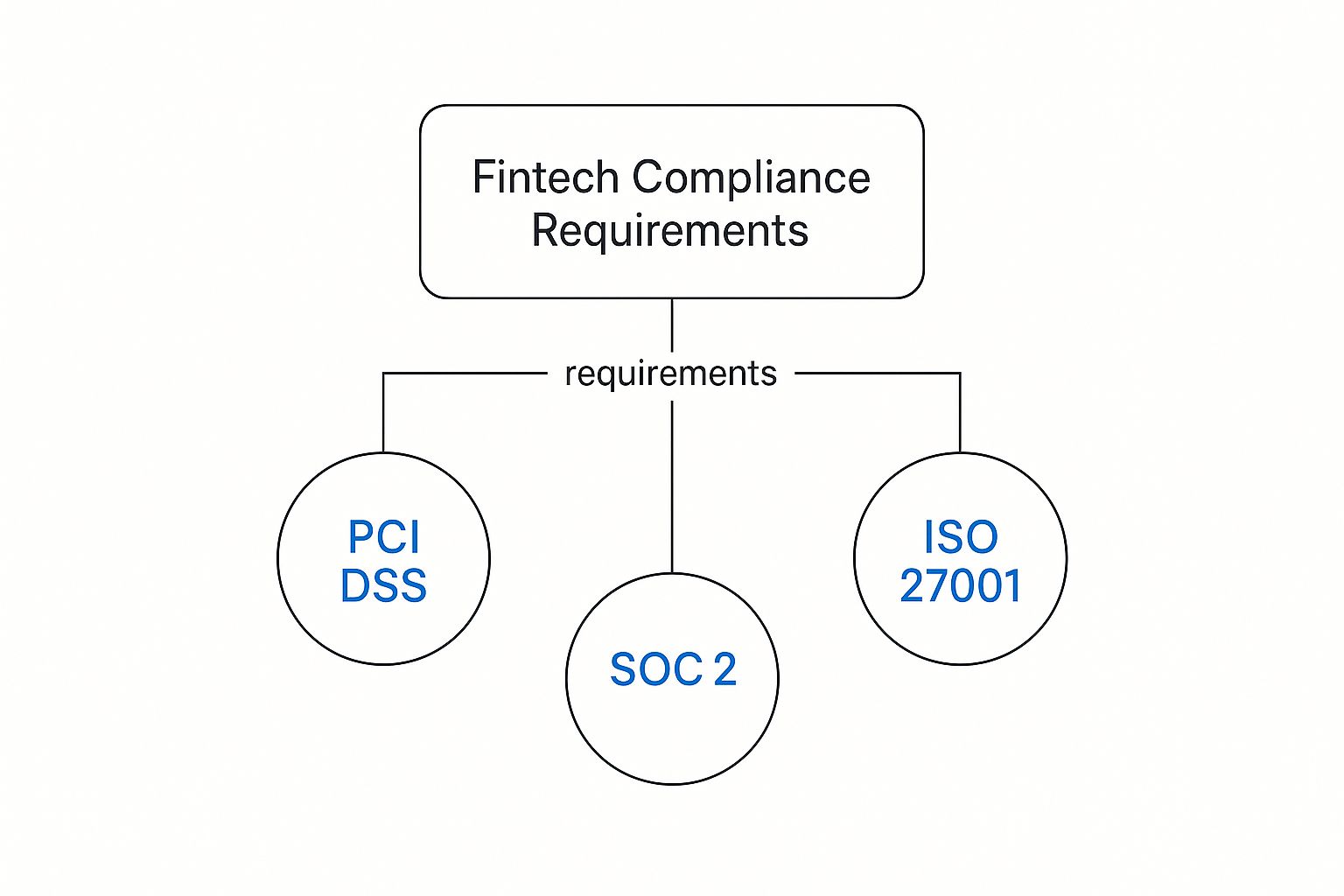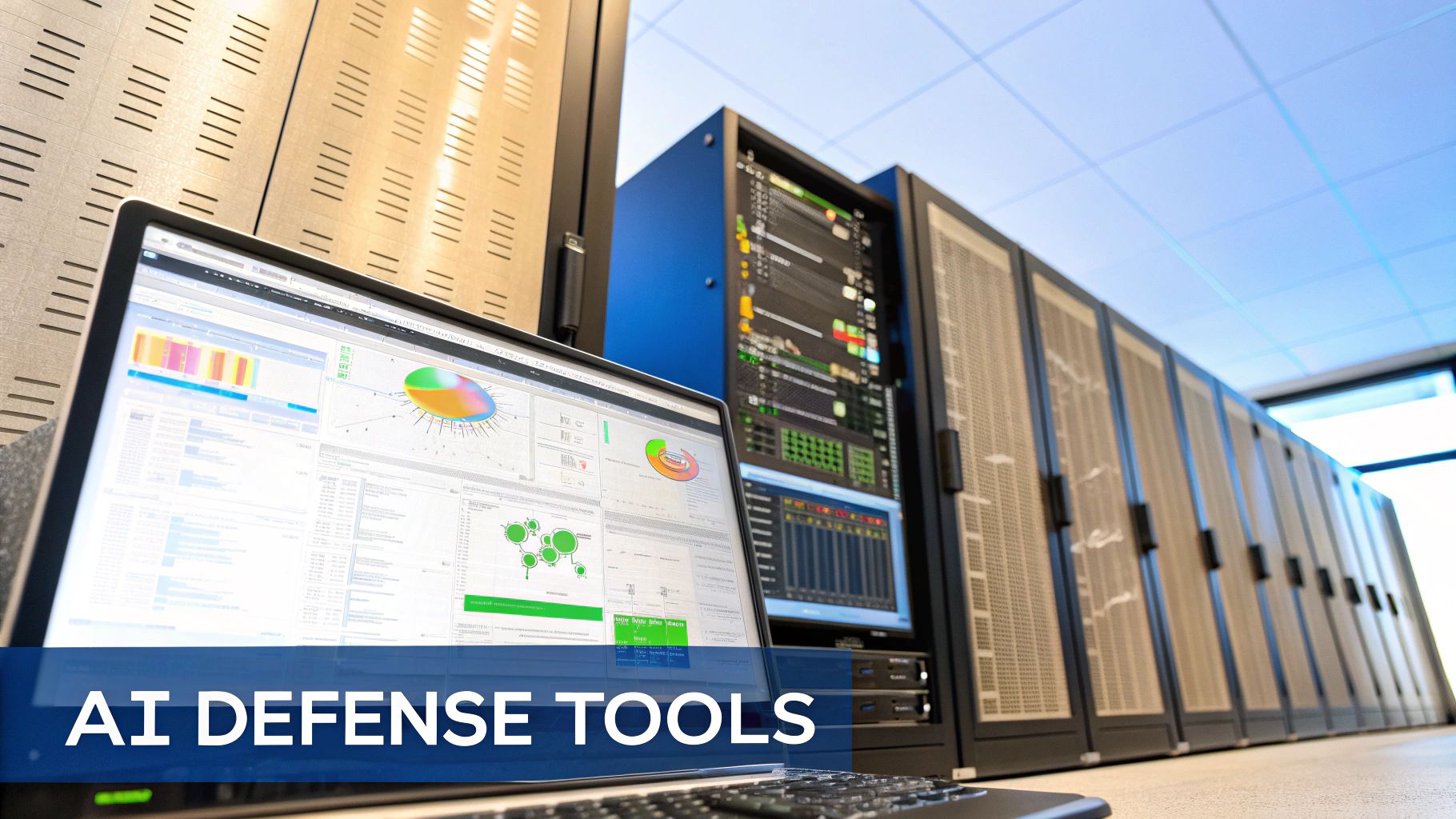Cybersecurity in fintech is all about protecting sensitive financial data from digital threats. As the fintech industry grows, MSPs and vCISOs have a great opportunity. You can help clients move from a reactive "wait for the fire" mindset to a proactive defense.
This is your chance to become the partner who makes sure their foundation is solid before any cracks appear.
Why Fintech Security Is A Critical MSP Opportunity
The fintech world moves fast, creating amazing new tools for payments, lending, and investing. But that speed often leaves security gaps wide open. Startups are focused on getting to market quickly, and security can become an afterthought. This is where you, as an MSP or vCISO, can provide huge value.
For your fintech clients, the challenge isn't just stopping hackers. They are also dealing with complex systems that need to connect flawlessly. Every third-party app, API, or cloud service they use is another potential door for an attacker.
Think of it like a modern house with dozens of windows and smart locks. Each one needs to be secured, or the whole building is at risk.

Shifting From Break-Fix to Proactive Defense Models
For years, IT support was a "break-fix" model. Something breaks, you get a call, and you fix it. But for cybersecurity in fintech, that model is a recipe for disaster. Waiting for a breach in the financial sector is like waiting for a house to burn down before calling for help.
By the time the alarm goes off, the damage is done. Data is gone, and customer trust is destroyed. A proactive approach is the only way forward. You're not just a problem-solver; you're a strategic partner who builds a strong security posture from the ground up.
This means doing regular assessments and smart planning. You can learn more about this strategy in our guide to cybersecurity for MSPs. The fintech environment creates specific challenges that you are perfectly positioned to solve.
Key Fintech Security Challenges MSPs Can Solve
The penetration testing industry often has a problem with inflated prices and long lead times. We are the solution. We offer affordable, manual, and fast white label pentesting so you can be the hero for your clients. We are a channel-only partner, so we never compete with our MSP or vCISO clients.
Here are the core challenges you'll help your clients navigate:
- Rapid Innovation vs. Security: Product teams race to launch features, often creating vulnerabilities. We offer manual pentesting from certified pentesters (OSCP, CEH, CREST) to find flaws that automated tools miss. This makes your clients' products more secure from the start.
- Complex Integrations & APIs: Fintech platforms are a web of third-party APIs. A single weak link can expose their entire system. You can provide API security testing to ensure their whole ecosystem is secure.
- Heavy Regulatory Burden: Fintech companies are buried under compliance demands like PCI DSS, SOC 2, and HIPAA. We deliver compliance-ready pentest reports that satisfy auditors and help you build trust.
By addressing these needs, you become a core part of their risk management strategy. We handle the technical work quickly, so you can deliver clear, actionable reports. This positions you as the smart, fast, and affordable solution.

Mastering Critical Fintech Compliance and GRC Frameworks
For a fintech company, compliance isn't just a suggestion; it's their license to operate. Think of it like a restaurant needing to pass a health inspection. Compliance frameworks are the fintech world's health certificate, proving they can be trusted with financial data.
Navigating these regulations can feel complex, but they are blueprints for a secure operation. For you, the MSP or vCISO, mastering these frameworks is how you become an essential partner.
Here’s the rundown on the key frameworks:
- PCI DSS (Payment Card Industry Data Security Standard): If your client handles credit card data, PCI DSS compliance is mandatory. It's a specific set of rules covering everything from network security to data encryption.
- SOC 2 (Service Organization Control 2): Think of SOC 2 as a report card on how well a company protects customer data. It’s about proving you have effective controls in place and is often a requirement for enterprise partners.
- ISO 27001: This is the international standard for information security management. ISO 27001 provides a framework for building a complete Information Security Management System (ISMS) and shows a company has a serious, risk-based approach to security.
How Pentesting Connects to Fintech Compliance Needs
So, where does a pentest fit in? Just about every major compliance framework either requires or strongly recommends regular penetration testing. An audit checks if you have locks on the doors. A pentesting engagement checks if those locks can be picked. It's real-world proof that security controls work.
A risk assessment might flag a potential weakness, but a manual pentesting engagement confirms if it can be exploited. This is the kind of evidence auditors for frameworks like SOC 2 and ISO 27001 need to see. They want proof of proactive security, not just policies on a shelf.
Most fintech startups need to prove compliance but can't afford the high cost and long waits of traditional pentesting. This is the gap you can fill. By offering fast, affordable, and white label pentesting, you become the solution to their biggest growth problem.
You're no longer just selling a one-off test. You're providing a critical part of their compliance and GRC strategy. This is how you position yourself as a strategic partner who understands their business. Ready to help your clients meet their fintech compliance goals? Contact us today to see how our reseller program can get you started.

Understanding Top Cybersecurity Threats in Fintech Today
Fintech companies are a prime target for attackers. The bad guys aren't using generic malware anymore; they're deploying surgical strikes designed for the financial sector. Understanding these modern threats is the first step to building a defense that actually works.
Forget the old emails from a Nigerian prince. Today's phishing is targeted, well-researched, and very convincing. Attackers craft emails that look like they're coming from the CEO or a trusted vendor. These messages create urgency, tricking an employee into clicking a link that unleashes malware.
Attackers are also using AI to create "deepfakes," which are realistic audio or video clips. A CFO might get a voicemail that sounds exactly like their CEO, demanding a multi-million dollar wire transfer. This isn't science fiction; it's happening now, as cybersecurity threats are evolving.
These attacks exploit trust, not just code, which is why manual pentesting is so important. It takes a creative human mind, thinking like an attacker, to defend against these threats.
Defending Against API and Supply Chain Attacks
No fintech app is an island. They are all connected to other services through Application Programming Interfaces, or APIs. Think of an API as a waiter carrying information between different systems. They're the glue holding modern finance together, but they are also a huge target.
If an API isn't secure, an attacker can steal sensitive data or hijack connected systems. An automated scanner might catch obvious flaws, but it takes a human expert to find the subtle ways an API can be abused.
Sometimes, the biggest threat to cybersecurity in fintech sneaks in through the supply chain. This is the web of third-party vendors and software providers a fintech company relies on. If an attacker can breach a less-secure vendor, they can use that as a tunnel into your client's network.
This is a massive blind spot. A risk assessment and penetration testing engagement can uncover these inherited risks. As a reseller, this comprehensive view positions you as a true security strategist. Our affordable, white label pentesting from OSCP and CREST certified pros delivers the deep analysis needed to expose these hidden dangers.

Building Proactive Fintech Risk Management Strategies
Waiting for a breach before acting is a huge mistake in fintech. A proactive risk management strategy means you are not waiting for the storm, you are preparing your defenses before it hits. This is about moving beyond simple compliance checklists to a security plan that anticipates threats.
You can't defend what you don't understand. The foundation of a solid security strategy is a thorough risk assessment. Think of it as a blueprint of your client's digital operations. You need to map out every asset and figure out what could go wrong.
This goes beyond technical bugs. It's about understanding business risk. You can get a deeper look at this process in our guide to designing a cybersecurity risk assessment framework.
A risk assessment tells you where weak points might be. A penetration test shows you what a real attacker could do with them. Regular, manual pentesting is the only way to test defenses against real-world attack methods. Our experts, with certifications like OSCP, CEH, and CREST, think like attackers to find vulnerabilities automated tools miss.
Becoming The Affordable White Label Pentesting Solution
The traditional pentesting industry has a problem: it's slow and expensive. This model freezes out many fintech companies that need high-quality testing. That industry gap is your opportunity.
We are a channel-only partner. We never sell directly to your clients or compete with you. Here’s how we help you become the go-to security provider for your fintech clients:
- Affordability: We offer top-tier manual pentesting at a price that makes sense for your clients' budgets.
- Speed: We turn around reports quickly, so your clients get actionable results fast.
- White Label Pentesting: Our services are 100% white-labeled. You deliver our expert reports under your brand.
As a reseller, you can offer these vital GRC and security validation services without the overhead of an in-house team. You solve a critical problem for your clients and build a new revenue stream. Let us be your secret weapon in delivering exceptional cybersecurity in fintech. Contact us today to learn more.
How to Discuss Pentesting With Your Clients
Navigating cybersecurity in fintech brings up a lot of questions. Your clients look to you for clear answers. Here is some practical advice on the topics that matter most.
Think of an automated scanner as a security guard with a checklist. They check known doors and windows. It's fast and catches obvious issues. Manual pentesting is like hiring a detective to actually break in. They don't follow a script and will find clever ways to bypass security. Our OSCP and CEH certified pentesters do the same for your client's digital systems.
The cost of a penetration test can be a pain point. Big firms charge high prices, which is a barrier for many fintech companies. We believe security shouldn't be a luxury. Our model provides affordable, high-quality manual pentesting. As a channel-only partner, we offer white label pentesting at a price that lets you, the reseller, provide great value.
When you sell a pentest, focus on business risk, not jargon. Frame the conversation around outcomes they care about. A pentest isn't just an expense; it's an investment that unlocks growth. It's a sales tool to close bigger deals, a compliance checkbox for SOC 2 or PCI DSS, and brand insurance against a breach.
Ready to become the go-to security partner for your fintech clients? MSP Pentesting provides the fast, affordable, and channel-only pentesting services you need to succeed.

.avif)
.png)